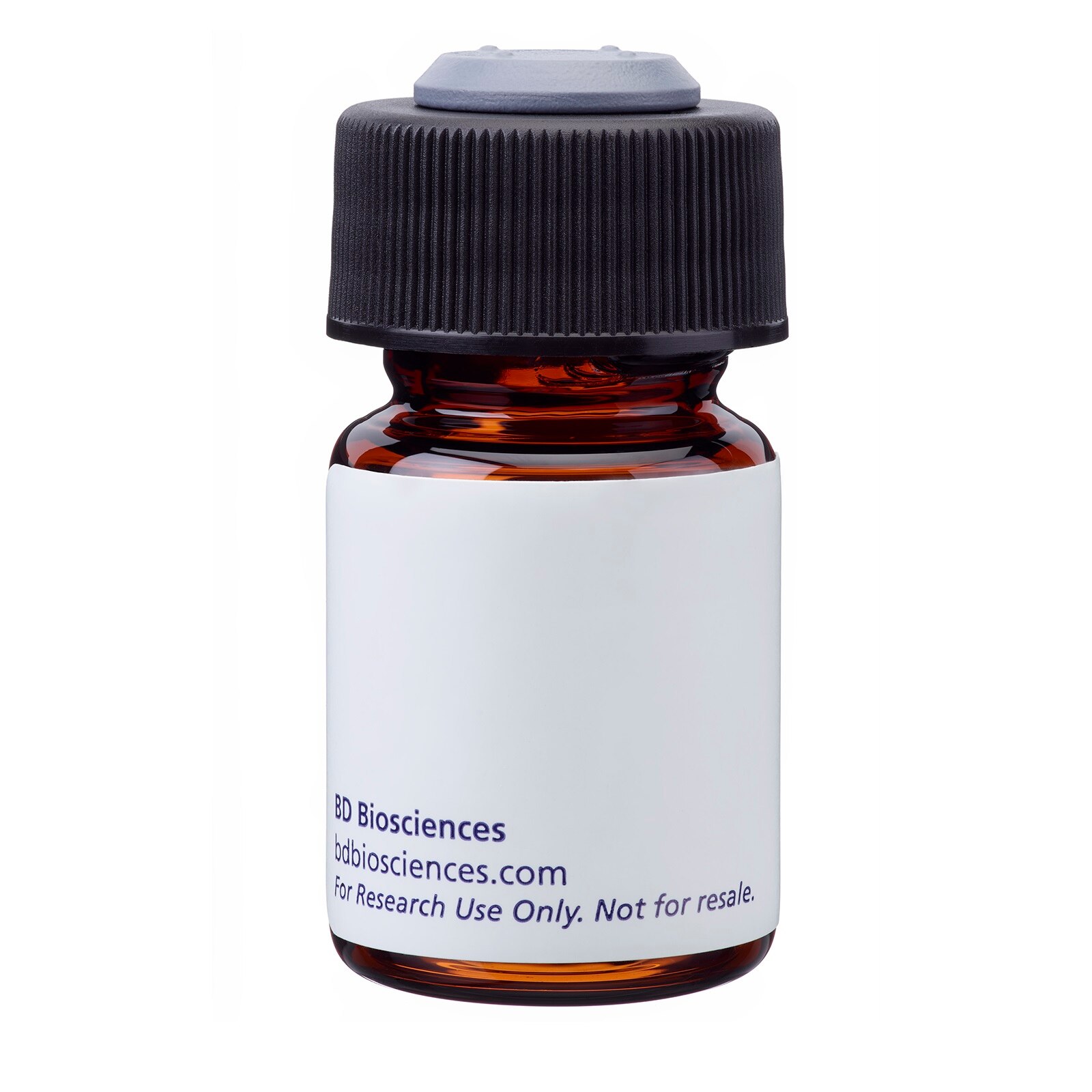Old Browser
This page has been recently translated and is available in French now.
Looks like you're visiting us from {countryName}.
Would you like to stay on the current country site or be switched to your country?




Flow cytometric analysis of Integrin β7 expression on human peripheral blood lymphocytes. Whole blood was stained with either APC Rat IgG2a, κ Isotype Control (Cat. No. 551139; dashed line histogram) or APC Rat Anti-Integrin β7 antibody (Cat. No. 551082; solid line histogram). Erythrocytes were lysed with BD FACS Lysing Solution (Cat. No. 349202). The fluorescence histograms were derived from gated events with the forward and side light-scatter characteristics of intact lymphocytes.


BD Pharmingen™ APC Rat Anti-Integrin β7

Regulatory Status Legend
Any use of products other than the permitted use without the express written authorization of Becton, Dickinson and Company is strictly prohibited.
Preparation And Storage
Product Notices
- This reagent has been pre-diluted for use at the recommended Volume per Test. We typically use 1 × 10^6 cells in a 100-µl experimental sample (a test).
- An isotype control should be used at the same concentration as the antibody of interest.
- Source of all serum proteins is from USDA inspected abattoirs located in the United States.
- Caution: Sodium azide yields highly toxic hydrazoic acid under acidic conditions. Dilute azide compounds in running water before discarding to avoid accumulation of potentially explosive deposits in plumbing.
- Species cross-reactivity detected in product development may not have been confirmed on every format and/or application.
- This APC-conjugated reagent can be used in any flow cytometer equipped with a dye, HeNe, or red diode laser.
- For fluorochrome spectra and suitable instrument settings, please refer to our Multicolor Flow Cytometry web page at www.bdbiosciences.com/colors.
- Please refer to www.bdbiosciences.com/us/s/resources for technical protocols.
Companion Products




The FIB504 monoclonal antibody specifically recognizes mouse integrin β7 subunit (130 kDa) but also crossreacts with human integrin β7. Integrin β7 associates with α4 (CD49d) expressed on subsets of lymphocytes and thymocytes. It also associates with αIEL (CD103) expressed on T cells adjacent to mucosal epithelium and intraepithelial lymphocytes. Integrin β7 plays an important role in the adhesion of leukocytes to endothelial cells promoting the transmigration of leucocytes to extravascular spaces during the inflammatory response.

Development References (7)
-
Andrew DP, Berlin C, Honda S, et al. Distinct but overlapping epitopes are involved in alpha 4 beta 7-mediated adhesion to vascular cell adhesion molecule-1, mucosal addressin-1, fibronectin, and lymphocyte aggregation. J Immunol. 1994; 153(9):3847-3861. (Biology). View Reference
-
Berlin C, Berg EL, Briskin MJ, et al. Alpha 4 beta 7 integrin mediates lymphocyte binding to the mucosal vascular addressin MAdCAM-1. Cell. 1993; 74(1):185-195. (Biology). View Reference
-
Butcher EC, Picker LJ. Lymphocyte homing and homeostasis. Science. 1996; 272(5258):60-66. (Biology). View Reference
-
Erle DJ, Briskin MJ, Butcher EC, Garcia-Pardo A, Lazarovits AI, Tidswell M. Expression and function of the MAdCAM-1 receptor, integrin alpha 4 beta 7, on human leukocytes. J Immunol. 1994; 153(2):517-528. (Biology). View Reference
-
Kishimoto T. Tadamitsu Kishimoto .. et al., ed. Leucocyte typing VI : white cell differentiation antigens : proceedings of the sixth international workshop and conference held in Kobe, Japan, 10-14 November 1996. New York: Garland Pub.; 1997.
-
Rott LS, Briskin MJ, Andrew DP, Berg EL, Butcher EC. A fundamental subdivision of circulating lymphocytes defined by adhesion to mucosal addressin cell adhesion molecule-1. Comparison with vascular cell adhesion molecule-1 and correlation with beta 7 integrins and memory differentiation. J Immunol. 1996; 156(10):3727-3736. (Biology). View Reference
-
Teague TK, Lazarovits AI, McIntyre BW. Integrin alpha 4 beta 7 co-stimulation of human peripheral blood T cell proliferation. Cell Adhes Commun. 1994; 2(6):539-547. (Biology). View Reference
Please refer to Support Documents for Quality Certificates
Global - Refer to manufacturer's instructions for use and related User Manuals and Technical data sheets before using this products as described
Comparisons, where applicable, are made against older BD Technology, manual methods or are general performance claims. Comparisons are not made against non-BD technologies, unless otherwise noted.
For Research Use Only. Not for use in diagnostic or therapeutic procedures.
Report a Site Issue
This form is intended to help us improve our website experience. For other support, please visit our Contact Us page.